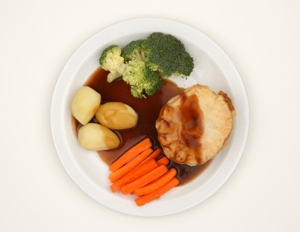Do we face a future of more expensive meals?
Release Date 02 February 2012

The era of ever-decreasing food prices has come to an end, according to leading figures in agriculture.
That was one of the messages to emerge from a conference at the University of Reading on Monday (January 30) of academics, farmers, business people and students.
The student-run event, hosted jointly with the Department of Agriculture, Policy and Development, was the 46th consecutive annual conference of the University of Reading Agricultural Club.
Around 250 guests heard speakers including Peter Kendall, president of the National Farmers' Union, who said the public needed to have a radical rethink about its attitude towards farming - or society could face an even more challenging future.
Professor Richard Ellis, professor of agriculture and Dean of the University's Faculty of Life Sciences, said after the event that prices could not continue their relative downward trend.
He said: "It is clear that whilst food remains cheap in historical terms, the 50 or more year era of ever-cheaper food does appear at the least to have stalled.
"The recession may be confusing that picture as little, but it would be imprudent for society and governments to assume that the trend of the last 50-60 years will resume."
Other speakers at the event included Cedric Porter, of Supply Intelligence and director of the Oxford Farming Conference, Edward Garner of Kantar WorldPanel, and Heather Jenkins from Waitrose.
A panel debate was led by John Giles of agribusiness consultancy Promar International, and included Iain Lindsay, farm manager of Sir Richard Suttons Settled Estates, Tony Cooke of caterers Sodexo, and David Gregory, visiting professor at the University of Reading and an expert in food security.
Delegates at the conference, which was sponsored by Smiths Gore and Lloyds TSB Agriculture, included farmers, land agents, scientists and academics, including members of the Institute of Agricultural Management and the Newbury and District Agricultural Society.
Conference organiser and agriculture student Owen Piper thanked the speakers and sponsors for their help in making the event happen.
"Turbulent economies at home and elsewhere in the EU have raised doubts about the future of food production," he said. "In real terms food still represents an extremely tiny fraction of the average household budget.
"Some members of the lively and heated panel still believe that the consumer is king. Personally, I think that while the era of cheap food may not quite be over yet, we may soon have to face up to the reality of rising prices."
ENDS
For more information, please contact Pete Castle at the University of Reading press office on 0118 378 7391 or p.castle@reading.ac.uk.
The University of Reading's School of Agriculture, Policy and Development is a world leader in teaching and research in the natural and social sciences relating to agriculture, the food chain, rural environments and the countryside and international development.
In the latest Research Assessment Exercise (2008), 45% of its outputs were rated as either world-leading or internationally excellent. Reading is the UK's top university for impact in Agricultural Sciences research (ISI Web of Knowledge, Essential Science Indicators).
The University of Reading is ranked as one of the top 1% of universities in the world, and is one of the leading research-intensive universities in the UK.